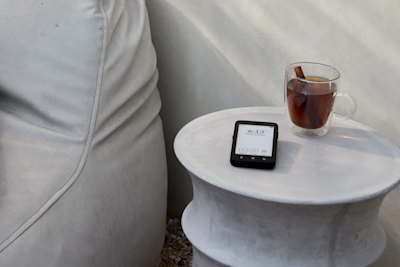
5 Common Sleep Myths Debunked!
Common sleep misconceptions
Sleep is a sacred and rejuvenating practice that we all need in order to thrive. Without it, our bodies and minds suffer, which is why it's crucial to get the most out of our sleep time.
Unfortunately, there's a lot of misinformation out there that can harm our sleep quality and quantity.
Let’s go over the top five sleep myths which might be keeping you from getting the rest you need and deserve.
Mudita Harmony2
Get ready to awaken to a whole new understanding of sleep!
Myth #1: How long you sleep is all that matters
One of the most common sleep myths is that how long you sleep is all that matters. However, the truth is that the quality of your sleep is just as important as the quantity. It is possible to sleep for 8 hours but still wake up feeling tired and groggy. This is because the quality of your sleep is affected by many factors, including the environment, noise, and light levels in your bedroom.
To ensure that you get a good night's sleep, it is important to create a sleep-conducive environment. This includes keeping your bedroom quiet, cool, and dark. You should also invest in a good quality mattress and pillows to ensure that you are comfortable throughout the night.
Myth #2: Watching TV or using electronic devices before bed helps you relax
Many people believe that watching TV or using electronic devices before bed helps them relax & fall asleep faster. Some even claim that they can’t fall asleep without the TV being on. However, the truth is that these devices emit blue light, which can suppress the production of melatonin, a hormone that regulates sleep. This can lead to poor sleep quality, as well as disrupted sleep.
To ensure that you get a good night's sleep, it is important to avoid using electronic devices before bed. Instead, you should try relaxing activities such as reading a book, taking a warm bath, or practicing meditation. These activities can help you relax and prepare your mind and body for sleep.
Ideally, it’s best to remove all electronics devices from your bedroom. If you use your smartphone as an alarm clock, consider switching to a classic alarm clock, like Mudita Bell. For a more mindful option, check out Mudita Harmony.
READ: Screen Time & Sleep: How Digital Devices Affect Sleep
Myth #3: Snoring is harmless
Snoring is often dismissed as harmless. However, the truth is, it can be a sign of a serious sleep disorder known as sleep apnea. Sleep apnea is a condition where the airway becomes blocked during sleep, causing breathing to stop and start repeatedly throughout the night.
If you snore loudly or frequently, it is important to speak to your doctor to determine if you have sleep apnea. Treatment for sleep apnea can improve the quality of your sleep and reduce the risk of developing other health problems.
Myth #4: You can catch up on lost sleep
This is a BIG ONE. Many people believe that they get by on minimal sleep during the week, because they can catch up on lost sleep by sleeping in on the weekends. However, nothing could be further from the truth. This approach can disrupt your circadian rhythm and make it harder to fall asleep at night.
Sleeping in on weekends or trying to catch up on sleep after a few nights of inadequate sleep may make you feel temporarily rested, but it does not make up for the sleep debt you've accumulated. Instead, it can lead to further disruption of your sleep-wake cycle, making it harder for you to get the quality sleep you need to feel your best.
To ensure that you get a good night's sleep, it is important to maintain a consistent sleep schedule. This means going to bed and waking up at the same time every day, even on the weekends
Myth #5: Everyone needs 8 hours of sleep
It's important to recognize that everyone has different sleep needs; some people function well with less sleep, while others need more. The general rule is that most people need somewhere between 7-9 hours per day. That's why it's key to pay attention to how you feel the next day to determine what works for you. However, it's generally not advisable to regularly sleep less than six hours per night. Research indicates that consistently getting less than six hours can increase the risk of stroke and heart disease. This may be because insufficient sleep can trigger a stress response, leading to an increased heart rate and higher blood pressure. So, it's key to find the right amount of sleep for your health and well-being.[1]
Mudita Alarm Clocks for a good night's rest
If you are struggling to get a good night's sleep, investing in a Mudita alarm clock can help. Our mindful alarm clocks, Mudita Bell and Mudita Harmony were designed with your sleep in mind, and aim to provide a peaceful waking experience that won't disrupt your natural sleep cycle.
Unlike traditional alarm clocks which can startle you awake with loud, jarring noises, Mudita alarm clocks offer a variety of soothing wake-up sounds, such as gentle alarms or nature sounds. You can also customize the brightness of the display, ensuring that the clock won't disrupt your sleep with bright, glowing numbers.
However, Mudita Harmony does more than just wake you up gently. It also offers features to help you wind down at night, such as a meditation timer, and a relaxation library with a variety of calming sounds to help you drift off to sleep.
Investing in a Mudita alarm clock is an investment in your overall well-being. By prioritizing a peaceful, restful night's sleep, you'll wake up feeling refreshed and ready to tackle the day ahead.
Bottom Line
Debunking sleep myths is crucial to improving our overall health and well-being. By understanding the science behind our sleep patterns, we can make informed decisions about our daily routines and habits. Don't believe everything you hear when it comes to sleep; instead, rely on evidence-based information to guide your choices. Remember, quality sleep is essential for a healthy life, and it's never too late to make positive changes to your sleep habits. So let's put these common myths to rest and prioritize getting the restful, restorative sleep our bodies and minds need.
Sweet dreams!
If you’d like to read more about improving your sleep hygiene, please check out our Sleep Better page or read some additional articles connected to the subject on our blog:
Also consider joining our Mudita Community on our forum.
Related stories

Why Kompakt is a Different Kind of Upgrade for the New Year
A different kind of upgrade for the new year. Discover how Mudita Kompakt, a minimalist phone, helps reduce digital overload & restore focus, balance & clarity.

Black Friday and The Luxury of Disconnection
Explore how disconnection has become a modern luxury and how Mudita’s mindful products make calm, presence, and digital balance easier to achieve.

Win the Gift of Disconnection in Our Mudita Kompakt Giveaway
Enter the Mudita Kompakt Giveaway for a chance to win two minimalist E ink phones designed for digital detox, calm, privacy, and presence.
If you'd like to receive the best stories from our blog, keep up to date with our progress and get notified about our product releases and special discounts.